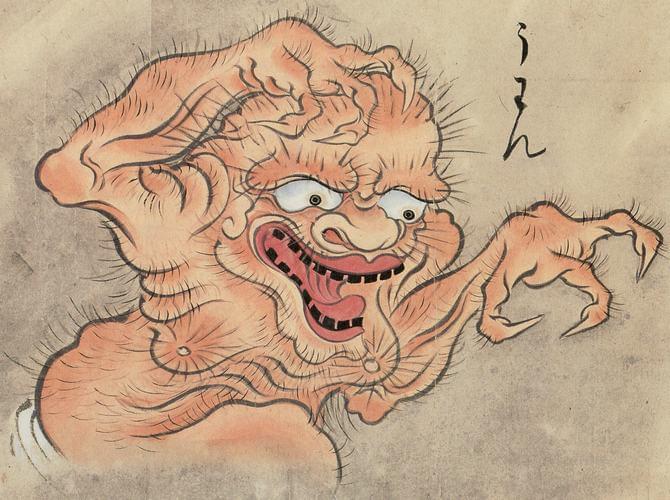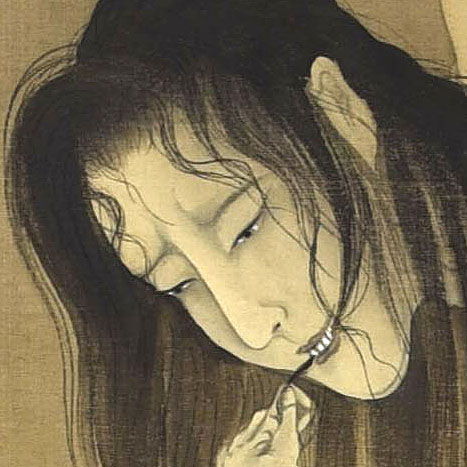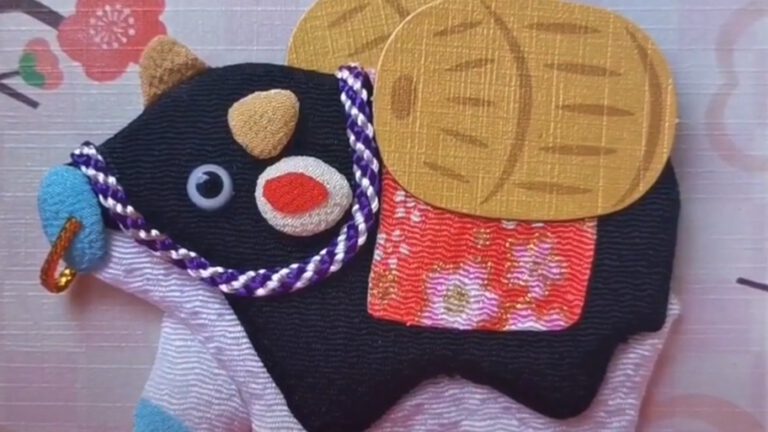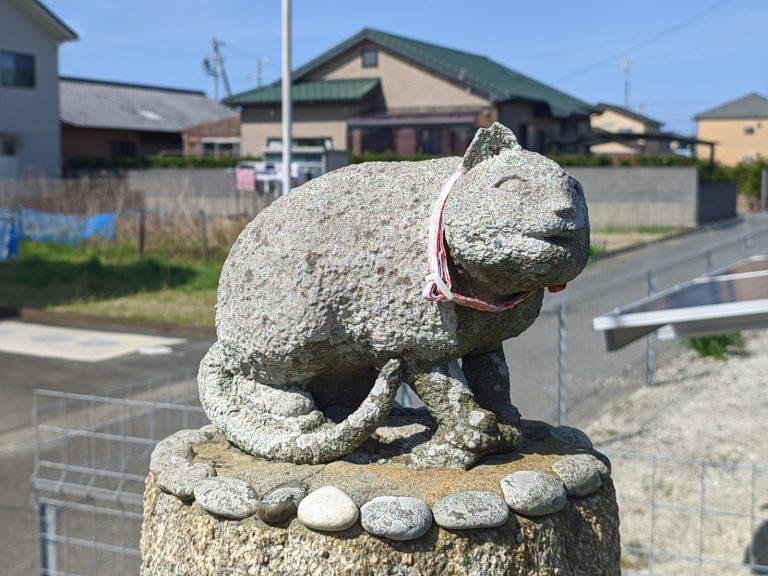It’s October. Time to pull a blanket around your shoulders, light a candle against the dark, and listen to a good old-fashioned ghost story.
There are many versions of the tragic tale of Japan’s most famous ghost, Oiwa-san.
But today, let me tell you my own retelling of her classic tale.
Hey, hey. I’m Thersa Matsuura, and you’re listening to Uncanny Japan.
I’m the author of the book of Japanese folklore, and coming in November, the Yokai Oracle Deck. 60 beautifully illustrated cards with a guidebook that teaches you bits of Japanese wisdom.
Let’s say you wake up, and you pull the kitsune bii, fox fires card. Well, then you’ll learn all about the fascinating word genwaku, which means dazzlement or bewilderment, but with nuances of mystery, confusion, and even danger.
Look around. Are you being charmed by something particularly bewitching? Maybe it’s time to step back and look at it objectively. Get a little perspective.
There’s more than that, of course. That’s just a little taste of what the cards hold. You can pre-order the Yokai Oracle Deck anywhere you buy books or Oracle cards, and those pre-orders really do help authors.
They count all at once on the actual launch day, which shows both the publisher and all the bookstores everywhere that there’s some excitement behind the book or the cards. So the item will find its way into more stores, and of course, the alchemy that drives the algorithm will also take notice.
A quick thank you to everyone at our network, Spectre Vision Radio. But if you have the means and you do want to listen to the shows without the ads, just the creepy atmosphere and the stories, for five dollars a month, you can get the shows without ads, usually a half a day early, on the Uncanny Japan Patreon page.
Today’s background ambience is by Julian Ray, and it’s put together by Rich Pav. Thank you both.
Now, let’s get on with today’s episode.
The Story of Yotsuya Kaidan
I did tell the story of Yotsuya Kaidan back in episode 42, and there I mentioned that there have been so many versions throughout the years, and they’re all really good. The most famous, though, was a kabuki play written by Tsuruya Namboku IV. It was called “Tōkaidō Yotsuya Kaidan” and premiered on stage in 1825.
He wrote the story based on some true-life happenings and scandals and murders, but also weaving in the idea of the vengeance of the dead. Of the vengeful ghost wife.
Oiwa’s story has also been depicted in woodblock ukiyo-e art, film, TV, books, and even modern horror. Where do you think some of the inspiration for Sadako in the Ring series came from?
So while I tell you about the story in episode 42, for today I rewrote the tale, telling it like it was just that, a short story.
And just a heads up, it is a ghost story with a little body horror mixed in, so it could probably not be appropriate for the younger audience. If you’re not sure, have one of your parents listen first and give you the thumbs up or the thumbs down on this episode.
Let’s begin.
1. The Crossroads After Dark
“Leave her,” Oiwa’s father demanded. “For some reason she loves you and she won’t listen to me. Since losing her mother, there’s no one to talk sense into her.”
“I’ll find work, I promise.” Iemon, on his hands and knees, pressed his forehead into the dirt. He hated groveling.
Groveling was one of the things that pushed him to the edge, where his vision went smoky and he couldn’t be blamed for what came next.
“Nonsense. Find a way to get her to come home to me, where she can be taken care of properly.” The out-of-work samurai thought carefully about his next response.
A chorus of crickets chirred in the trees on one side, on the other, way across the fields. He could make out the clop, clop, clop of Geda stumbling down the streets in drunken laughter. Why did Oiwa’s father pick such an out-of-the-way place to talk?
“There’s a job offer,” Iemon started.
“You’ve had plenty of time. The poor girl has to work in a tea house to pay for your dice and alcohol.” Iemon hated being interrupted, almost as much as he hated groveling.
But he wrestled his temper down by focusing on what was near, what was real. The damp scent of earth mixed with the heady perfume of the jasmine-covered o-jizō statue that marked the crossroads. The drumbeat of blood pounding in his ears, and the worn, braided cotton of his sword hilt inside his tightened fist.
And don’t think for a moment I haven’t heard about the debauched goings-on at Dr. Ito’s estate, either. Panic and shame shot through Iemon. How did he know?
He took a long draw of night air, trembled in anticipation. What was the old man’s plan, anyway? Meeting out here, just the two of them? This could be considered self-defense.
“I’ve never met a more pitiful man.” His father-in-law, towering over him, chuckled. “You can’t even father a child.”
It was an easy fall over the edge. There was nothing he could do to stop it. Iemon leapt to his feet. At the same time, he withdrew his sword and swung upwards. He was quick enough that he got to savor the dumb look of surprise the old man had before he fell. Iemon’s favorite part.
He looked around. Nothing moved. No one to witness what he’d done. Iemon wiped his blade on the hem of his father-in-law’s kimono, rummaged until he found his kinchaku money pouch, dropped it into his sleeve, and fled. He needed a drink.
2. The Bedroom
Before going to sleep, Oiwa sat in front of her mirror and combed her hair with her mother’s boxwood comb, her most cherished possession. The slow act of pulling the fragrant, camellia-oiled tines through her long hair calmed her. The kushi itself had the power to give her strength. With all her heart, Oiwa believed this to be true.
“On her deathbed,” that’s what her mother had told her, as her hand, frail as a dried leaf, folded Oiwa’s fingers one by one around the smooth wooden comb.
It was strength Oiwa needed now, more than ever. She was still grieving the loss of her dear ha-ha-ue, when seven nights ago her husband returned with the devastating news that bandits had cut her father down at the crossroads just outside the city.
Her husband roared and vowed revenge, and it reminded her again why she still believed in him, that he was a good man, that he could defeat his demons and turn his luck around.
Maybe this act of justice would give him the focus and the confidence he needed.
“Kohei,” Oiwa said, addressing her long-serving family retainer, “is something troubling you? You’ve been worrying that shoji for the time it’s taken the incense to burn to ash.” “Ojou-sama, no, I—” her old friend stepped back from the paper door and dropped his hands. “I just thought it might get cold tonight, and I didn’t want a draft to come in.”
Kohei desperately wanted to tell her something. He had been trying for several days now, having grown up under his care in her father’s house, and now in this one, they knew each other’s moods and thoughts like close siblings. Surely he understood she knew this. So what terrible thing couldn’t he tell her?
“He’s late again,” Kohei said.
3. The Physician’s Estate
It was a while before Iemon dared return to the physician Ito’s manor. There were many nights when he was tempted to go, but every time he thought he caught the figure of Kohei lurking behind a vendor stall or disappearing into the crowd. He didn’t know if it really was his wife’s troublesome attendant or he was just going mad, but he wasn’t going to take any chances.
“Tameya-sama,” Oumei refilled Iemon’s cup, “the young woman’s heavy silk kimono, freshly incensed with sandalwood and clove, shushed as she moved and made his head swim.
This was the life he deserved. The thought of having to return to his own home, the greasy smell of burning sardine oil lamps, and the reek of boiling daikon made him furious. It wasn’t fair.”
“You are a charming one, Iemon.” Ito, Oumei’s father, flicked his hand and waited for the young woman to leave the room and slide shut the fusuma. In a quieter voice, he continued, “She’s very fond of you.”
“You know my predicament.”
“Let’s see if I remember. You don’t have any children, right?” Ito pinched a hair-like ball of kizami from the lacquered box and packed it into the bowl of his long kiseru pipe.
Iemon lowered his gaze. “Well, when you do, which I hope will be soon, you’ll realize that if you have a daughter as lovely as Oumei is, you’ll do just about anything to make her happy.”
The doctor used a pair of metal chopsticks to pluck out an ember from the hibachi and held it to the tobacco. He inhaled and the threads brightened, then vanished.
After a moment of thought, he exhaled the pungent, peppery smoke. “I don’t think there’s anything on earth as powerful as a parent’s love for their children.” Ito tapped the spent ash into a small porcelain bowl. “How is Oiwa-san, anyway?”
“Weak,” Iemon said. She lost her mother to the water sickness and now her father’s incident.
Iemon fidgeted, then threw his head back and finished his drink. Ito squinted at the clearly distressed man. He read people very well. He scanned the windows and the door to the hallway. “I do see a good man inside you,” he said. “I also see you struggling with your circumstances.” Leaning forward, he stuck his hand deep into the crossover fold of his kimono and withdrew a folded piece of washi paper. “Medicine,” Ito said and slid the package across the table. “It’s made specially for your dear wife. Have her drink it when she’s feeling run down, and I think your luck will change.”
4. Strength
Oiwa lit a stick of incense at the family altar and begged the spirits of both her mother and father for guidance. On top of the news she’d received earlier that day, she’d finally coaxed Kōhei to tell her what was bothering him. She’d never known the man she thought of like a brother to lie, but was having trouble believing his words. Yet again it was late and her husband wasn’t home.
The sharp clack, clack, clack of the watchman’s wooden clappers making his final rounds faded long ago. She was so tired, but she needed to talk to her husband. Iemon came home not long after, in good spirits but not stumbling, which was a positive sign.
He asked how his wife was feeling and seemed to be genuinely interested in her reply.
Oiwa thought for a moment the spirits were acting in her favor. She explained how depleted she was, even more than usual. Iemon fretted that he still had no news of the bandits and suspected that they’d fled the city. He mentioned he stopped by the temple of Kannon-sama in Asakusa to pray for help when he came across a well-recommended herbalist and healer who was set up on the grounds. Iemon removed a packet from his sleeve and gave it to his wife. He said to take this and it will restore your energy.
Oiwa looked at the yakubukuro with the brushed ink characters. Is it okay for a mother to take?
She placed one hand on her stomach. The realization took a long moment. Iemon, who had always wanted a child, didn’t react the way she thought he would, the way she hoped he would. His face reddened and his eyes darkened. Kohei was right. The demons overtook her husband, but that night he spared Oiwa his worst and stormed out of the house and back into the night.
“Ojou-sama,” Kohei, woken by the noise, wasn’t the kind of person to revel in being right. “Can you bring me some hot water?” Oiwa asked, opening the medicine pouch.
Maybe the kindness from a well-recommended herbalist at the temple would be of some help. She dipped the coarsely ground roots and leaves into her cup and stirred with her finger. She drank the bitter liquid down in one desperate swallow and screamed.
Let’s stop for the briefest of moments right here before we pick up on what happens to dear Oiwa-san.
5. Betrayal
It was the hour of the ox when Iemon crept through the front door. The city was silent. The moon was already descending over the western hills. He’d been gone a couple days, but he had to find somebody.
Iemon was confident both his wife and Kohei would be long asleep. He ushered inside the man, known only as Kuma, bare. The irony of paying the Yojinbo with the money he’d stolen from Oiwa’s father was not lost on him. He’d worked with Kuma before. He was a secret keeper, strong and could be trusted.
That’s all he needed. That and a lying witness. The story was going to be that Kuma needed a place to stay for the night. Iemon offered their front room, and when they came in, they found his wife with her faithful retainer. The murder would be an act of passion. What Iemon wasn’t expecting was to find Oiwa awake and sitting at her mirror, her back to him, a candle burning in the corner, hardened wax splashed all up the wall. Kohei wept quietly at the hem of her robe while she combed her hair. Neither one acknowledged his entrance. The room reeked of sick, the floor strewn with the remnants of a broken lamp, oil seeping into the mats. The entire contents of the family altar looked as if they’d been hurled about the room.
What rage had happened was past now, but the air still buzzed with it. Iemon resisted the urge to leave. He had a plan that he needed to stick to. This was his last chance for a better life.
Before he could bellow the accusal that he’d found the two together, his wife spoke. “You’re home, Dana-sama.”
She didn’t turn around. Her voice sounded strangled. A strange noise he realized now was the wheezing, her shoulders rising and falling with the effort of her unnatural breathing.
“You’re awake,” Iemon said and motioned for the hired yojimbo to come forward. The large man refused to move. Oiwa started to cough, a wet hacking that sprayed the mirror in front of her with blood. She showed no reaction, although Kohei backed away from his mistress.
“You have to help her,” he pleaded to Iemon. “Take her to your doctor, friend.” In the candlelight, Iemon could see something dark on the floor beside his wife.
He moved forward and then stopped at the horror of the realization. It was hair. Every stroke of the comb pulled out another thick, bloody clump of tangled black hair, which she carefully added to the pile.
“How many times have you betrayed my trust?” she asked, stopping her rhythmic motion and waiting for his answer. When none came, Oiwa turned around.
Iemon’s legs buckled and Kuma cried out behind him. One side of his wife’s face was monstrously swollen, the eye drooping and closed shut. All the hair on that side had been torn out, leaving only the raw, bloody scalp. Black veins spiderwebbed up her chest, neck, and mottled cheeks. On the other side of her face, her mouth was pulled into a wicked grin, showing blackened gums and missing teeth. There was movement and Kuma threw the money pouch at Iemon’s feet. “Take it. I don’t need your money.”
“Stay,” Iemon ordered. Oiwa recognized her father’s kinchaku. After a moment’s shock, a look of pure hate entered her one glaring eye.
It wasn’t only the other woman. His wife seemed to grow larger. Kohei whimpered at the far side of the room. “I will never forgive you. I curse you.”
Iemon withdrew his sword with trembling hands and raised it. “You will never be rid of me.” Oiwa looked perfectly calm as she pushed herself to her feet and took a step forward toward her husband. Kohei was pulling, trying to open a window. “Get him,” Iemon ordered Kuma. The large man obeyed. Iemon stepped forward and swung at his wife.
Later, the two men worked quickly and quietly. They removed a heavy wooden toita shutter. On one side, they nailed the body of Kohei and on the other, Oiwa. They carried it to the edge of the city and dumped it into the Onbo Canal, the filthy stagnant waterway where refuse and forgotten things were left to rot.
6. Ito’s Manor
It was late when Iemon arrived at the Ito estate. He knew nowhere else to go. The physician, after learning of Oiwa’s infidelity and subsequent demise, invited him into the Grand Zashiki, a room he rarely visited. The old doctor seemed buoyant as he lit an Andon lamp and explained that no one would blame him for his actions. A little extreme, yes, but surely he had been out of his mind with shock and grief to do such a thing. This would hold up in any court.
“Things look bad now, but I believe your luck is about to change,” the doctor said, exiting the room and stopping. “Oumei will bring you something to hush those frazzled nerves.”
It wasn’t long before Iemon heard the quick rhythmic patting of tabi socks on polished wood. They stopped, and the door slid open. Oumei, dressed in a simple but elegant kimono of layered crimson and gold, bowed her entrance and brought in a tray with a tokuri in a single cup.
For the time it took Iemon’s thoughts to mellow and the horror of what he and Kuma had done recede, the young Oumei sat across from him, asking questions of his life before his master fell. All the brave things he did, and faraway places he’d seen.
It was the moment when Iemon allowed himself to believe Ito’s hopeful prediction, and was bold enough to laugh out loud at something silly Oumei had said.
That an icy draft fell abruptly from the rafters. The young woman jumped. The oil lamp flickered and threw long shadows across the tatami mat floor and up the walls. That for an instant looked like the figures of Oiwa and Kōhei standing over him. Iemon flinched.
Oumei turned to tend to the dying flame, her delicate profile disappearing for an instant as the lamp dimmed and then sputtered back to life. When she looked back up at Iemon, it wasn’t the smooth, powdered face of the doctor’s daughter, but Oiwa’s malformed, bloody one staring back at him, grinning. “Husband,” she said through a wet, strangled throat, “such a coward you are. Did you think you could run? You will never be rid of me.”
Fear dimmed Iemon’s vision, and without thinking, he jumped up, overturning the table, and with two quick strokes, he cut the demon down. Oumei screamed and crumpled to the straw-mat floor.
Footsteps thundered down the hall. The door was thrown open, but it wasn’t the physician, Ito, who stood there, open-mouthed and in shock, but Kōhei, his pale, bloodless face in a mocking sneer. Iemon destroyed Kōhei’s ghost, stepped over Oumei’s father, and fled. Fled, but could not escape. Oiwa’s curse followed him wherever he went. For days, she appeared when he least expected it, in the face of a stranger in the crowd, in the shape of a broken paper lantern, in the curl of incense smoke at the temple. He had to get farther away.
7. Snake Mountain Hermitage
Iemon waded waist-deep out into the slow-moving river. He pushed aside reeds and thick river grass with the bamboo-framed net he’d found in the crumbling hut that he had been staying in for the last three days. His hunger, a constant knot in his stomach, had finally urged him outside.
Since coming to the abandoned hermitage, he hadn’t seen her. Maybe he was finally free. Maybe he was finally free. Something swam past his ankle, and the sudden, simple thought of roasting sweetfish by a fire made his mouth water and hope bloom in Iemon’s chest.
He took another step and banged his shin against something hard. He cursed. There was movement at his feet, a rolling over of water from warm to cold.
All at once, a wooden door rose to the surface in front of him. On it, the wretched, lifeless body of Kōhei. The reek of decaying flesh hit Iemon. He coughed, he choked, and flailed. He stumbled backwards. But this only caused the door to bob and turn over, revealing the other side. Oiwa. She, too, was still nailed to the wood, arms wide, the fingers of one hand grotesquely curled around her mother’s boxwood comb.
He didn’t remember her having it when he and Kuma had placed her there. Black river weeds tangled through what was left of her long, once-beautiful hair and plastered her tattered kimono, her body swollen underneath.
Scrambling to find purchase in the muddy riverbed, Iemon pushed the monstrosity away. This only made Oiwa’s loose head lull and turn to face him, her murderer.
Fear drummed his heart and panic stopped his breath. He couldn’t move. It felt like hands latched onto his ankles. He couldn’t look away. His wife’s purpling skin, the eye ruined by the poison wept real blood. The other, though, glared at him, saw right through him.
It wasn’t clouded in death, but alive with hate. A fat, discolored tongue struggled in her open mouth grimace. “You’ll never be free of me.”






